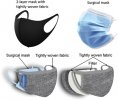Moderna’s vaccine is less potent against one coronavirus variant but still protective, company says
https://www.statnews.com/2021/01/25/moderna-vaccine-less-effective-variant/
Moderna is studying adding booster doses to its vaccine regimen after finding its Covid-19 vaccine was less potent against a coronavirus variant that was first identified in South Africa, the company said Monday.
In lab research that involved testing whether blood from people who had received the vaccine could still fend off different coronavirus variants, scientists found that there was a sixfold reduction in the vaccine’s neutralizing power against the variant, called B.1.351, than against earlier forms of the coronavirus, Moderna reported.
There was no loss in neutralization levels against a different variant, called B.1.1.7, that was first identified in the United Kingdom. Both variants are thought to be more transmissible than other forms of the SARS-CoV-2 virus.
Moderna said that despite the reduction in neutralizing antibodies against B.1.351, the antibody levels generated by its vaccine “remain above levels that are expected to be protective.” Still, it said it was going to start testing whether adding a booster dose to its existing two-dose regimen could increase the levels of neutralizing antibodies even further, and that it was going to start investigating a booster specifically designed against B.1.351.
…
[OA] Wu K, Werner AP, Moliva JI, et al. mRNA-1273 vaccine induces neutralizing antibodies against spike mutants from global SARS-CoV-2 variants. bioRxiv 2021:2021.01.25.427948. http://biorxiv.org/content/early/2021/01/25/2021.01.25.427948.abstract
Severe acute respiratory syndrome coronavirus-2 (SARS-CoV-2) is the causative infection of a global pandemic that has led to more than 2 million deaths worldwide. The Moderna mRNA-1273 vaccine has demonstrated ~94% efficacy in a Phase 3 study and has been approved under Emergency Use Authorization.
The emergence of SARS-CoV-2 variants with mutations in the spike protein, most recently circulating isolates from the United Kingdom (B.1.1.7) and Republic of South Africa (B.1.351), has led to lower neutralization from convalescent serum by pseudovirus neutralization (PsVN) assays and resistance to certain monoclonal antibodies.
Here, using two orthogonal VSV and lentivirus PsVN assays expressing spike variants of 20E (EU1), 20A.EU2, D614G-N439, mink cluster 5, B.1.1.7, and B.1.351 variants, we assessed the neutralizing capacity of sera from human subjects or non-human primates (NHPs) that received mRNA-1273.
No significant impact on neutralization against the B.1.1.7 variant was detected in either case, however reduced neutralization was measured against the mutations present in B.1.351.
Geometric mean titer (GMT) of human sera from clinical trial participants in VSV PsVN assay using D614G spike was 1/1852. VSV pseudoviruses with spike containing K417N-E484K-N501Y-D614G and full B.1.351 mutations resulted in 2.7 and 6.4-fold GMT reduction, respectively, when compared to the D614G VSV pseudovirus.
Importantly, the VSV PsVN GMT of these human sera to the full B.1.351 spike variant was still 1/290, with all evaluated sera able to fully neutralize. Similarly, sera from NHPs immunized with 30 or 100μg of mRNA-1273 had VSV PsVN GMTs of ~ 1/323 or 1/404, respectively, against the full B.1.351 spike variant with a ~ 5 to 10-fold reduction compared to D614G.
Individual mutations that are characteristic of the B.1.1.7 and B.1.351 variants had a similar impact on neutralization when tested in VSV or in lentivirus PsVN assays. Despite the observed decreases, the GMT of VSV PsVN titers in human vaccinee sera against the B.1.351 variant remained at ~1/300. Taken together these data demonstrate reduced but still significant neutralization against the full B.1.351 variant following mRNA-1273 vaccination.
https://www.statnews.com/2021/01/25/moderna-vaccine-less-effective-variant/
Moderna is studying adding booster doses to its vaccine regimen after finding its Covid-19 vaccine was less potent against a coronavirus variant that was first identified in South Africa, the company said Monday.
In lab research that involved testing whether blood from people who had received the vaccine could still fend off different coronavirus variants, scientists found that there was a sixfold reduction in the vaccine’s neutralizing power against the variant, called B.1.351, than against earlier forms of the coronavirus, Moderna reported.
There was no loss in neutralization levels against a different variant, called B.1.1.7, that was first identified in the United Kingdom. Both variants are thought to be more transmissible than other forms of the SARS-CoV-2 virus.
Moderna said that despite the reduction in neutralizing antibodies against B.1.351, the antibody levels generated by its vaccine “remain above levels that are expected to be protective.” Still, it said it was going to start testing whether adding a booster dose to its existing two-dose regimen could increase the levels of neutralizing antibodies even further, and that it was going to start investigating a booster specifically designed against B.1.351.
…
[OA] Wu K, Werner AP, Moliva JI, et al. mRNA-1273 vaccine induces neutralizing antibodies against spike mutants from global SARS-CoV-2 variants. bioRxiv 2021:2021.01.25.427948. http://biorxiv.org/content/early/2021/01/25/2021.01.25.427948.abstract
Severe acute respiratory syndrome coronavirus-2 (SARS-CoV-2) is the causative infection of a global pandemic that has led to more than 2 million deaths worldwide. The Moderna mRNA-1273 vaccine has demonstrated ~94% efficacy in a Phase 3 study and has been approved under Emergency Use Authorization.
The emergence of SARS-CoV-2 variants with mutations in the spike protein, most recently circulating isolates from the United Kingdom (B.1.1.7) and Republic of South Africa (B.1.351), has led to lower neutralization from convalescent serum by pseudovirus neutralization (PsVN) assays and resistance to certain monoclonal antibodies.
Here, using two orthogonal VSV and lentivirus PsVN assays expressing spike variants of 20E (EU1), 20A.EU2, D614G-N439, mink cluster 5, B.1.1.7, and B.1.351 variants, we assessed the neutralizing capacity of sera from human subjects or non-human primates (NHPs) that received mRNA-1273.
No significant impact on neutralization against the B.1.1.7 variant was detected in either case, however reduced neutralization was measured against the mutations present in B.1.351.
Geometric mean titer (GMT) of human sera from clinical trial participants in VSV PsVN assay using D614G spike was 1/1852. VSV pseudoviruses with spike containing K417N-E484K-N501Y-D614G and full B.1.351 mutations resulted in 2.7 and 6.4-fold GMT reduction, respectively, when compared to the D614G VSV pseudovirus.
Importantly, the VSV PsVN GMT of these human sera to the full B.1.351 spike variant was still 1/290, with all evaluated sera able to fully neutralize. Similarly, sera from NHPs immunized with 30 or 100μg of mRNA-1273 had VSV PsVN GMTs of ~ 1/323 or 1/404, respectively, against the full B.1.351 spike variant with a ~ 5 to 10-fold reduction compared to D614G.
Individual mutations that are characteristic of the B.1.1.7 and B.1.351 variants had a similar impact on neutralization when tested in VSV or in lentivirus PsVN assays. Despite the observed decreases, the GMT of VSV PsVN titers in human vaccinee sera against the B.1.351 variant remained at ~1/300. Taken together these data demonstrate reduced but still significant neutralization against the full B.1.351 variant following mRNA-1273 vaccination.



